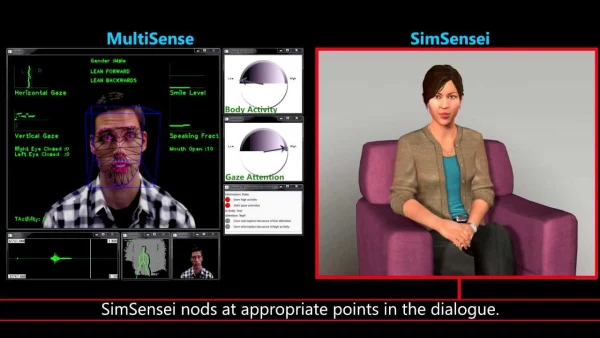In recent years, artificial intelligence (AI) has quickly entered various aspects of life, from healthcare and education to technology. One of the most prominent and controversial applications is its ability to treat mental health conditions, particularly depression. While traditional therapies conducted by psychologists remain the primary choice for patients, the emergence of AI systems like Ellie, a “virtual therapist” developed by the Creative Technology Institute at the University of Southern California (USC), is changing how we think about psychological therapy.
Ellie, a product of the SimSensei program, was developed with funding from the Defense Advanced Research Projects Agency (DARPA). It is a computer program capable of engaging in conversations with patients to help them address issues such as depression and post-traumatic stress disorder (PTSD). What makes Ellie unique is that she is not a real human but an AI system capable of analyzing patients’ emotions and behaviors by observing facial expressions, body language, and even speech rate. Using facial recognition technology, Ellie can track and analyze more than 66 points on a patient’s face, assessing the severity of depression symptoms. She also uses Kinect sensors to detect signs such as head movements, changes in eye gaze, and body posture.

One of the reasons Ellie is particularly effective in treating depression is her ability to create a safe, non-judgmental space. “The important thing is not that Ellie provides perfect answers, but that patients have a safe space to talk,” Gale Lucas, a social psychologist at USC, said in a study published in the Journal of CyberTherapy & Rehabilitation (2011). Patients may feel more comfortable communicating with an AI since they don’t have to face the judgmental gaze or the anxiety they often experience when talking to a real therapist. This not only helps patients feel freer in expressing their emotions but also makes them more open to discussing psychological issues that they may find difficult to articulate.
“Because of the absence of human judgment, patients are able to easily share deep personal feelings they may never have dared to disclose to real experts.”
A 2009 study by GE showed that 28% of patients admitted they had been dishonest when sharing mental health information with doctors. Ellie, although just an AI, helps address this issue by encouraging patients to be more open, thanks to the absence of judgment and privacy concerns. “Ellie is not a therapist,” Glota Stratou, a research programmer at USC, emphasized in an article published in Computers in Human Behavior (2014). “She is there to listen, and what’s important is that patients feel comfortable talking.”
“Ellie is not a therapist. She is there to listen and help patients feel more comfortable sharing their emotions.” — Glota Stratou, programmer at USC (Computers in Human Behavior, 2014)
This raises a significant question about the future of psychological therapy. Can AI fully replace humans in mental healthcare? While Ellie and other AI systems have demonstrated their capabilities in some studies, they are still tools for assistance. Replacing human therapists in every case is not easy, as the role requires not only behavior analysis but also empathy and a “human” touch that AI cannot replicate.
However, AI systems like Ellie could open a new avenue for providing therapy to people who cannot access experts. A study by Stanford University in 2022 showed that patients living in remote areas, where mental health professionals are scarce, could access therapeutic services through mobile platforms using AI. This could be an important solution to address the shortage of mental health experts, especially in underserved areas with limited healthcare services (Telemedicine and e-Health, 2022).
Although AI cannot completely replace humans, it is gradually becoming an indispensable part of treating mental health conditions. This technology helps reach patients who have difficulty speaking with doctors, creating a safe and secure environment for those dealing with psychological issues. With the continuous advancement of technology and AI, it is possible that in the future, virtual therapists will not just be a supportive option but an important solution to addressing human psychological challenges.


HPX24h > Science > Artificial Intelligence Outperforms Humans in Treating Depression
Top Reads from This Category
Science
The Mystery of the Brain Network that Regulates Human Attention Has Been Unveiled
Science
A New Era in HIV Prevention: Vaccine Set to Launch
Science
NSF Cuts 168 Jobs Amid Booming Science and Technology: Paradox or Strategic Move?
Science
NSF Cuts 168 Jobs – Is the U.S. Scientific Community in Danger?
Science
NSF Job Cuts: Who Benefits and Who Bears the Consequences?
Science
Gold in the Human Body: A Scientific Look at the ‘Hidden Gold’ Inside You
Science
Recreating the Mouse Brain in a Virtual World: The Future of Neuroscience
Discover New Topics
Parenting Tips
How Much Sleep Do Children Really Need?
Parenting Tips
How to Talk to Your Child About Divorce: Helpful Tips for Parents
Science
Laser Therapy Could Help Regrow Your Teeth – Did You Know?
Science
Nanotech Technology to Destroy Blood Clots: A New Breakthrough in Stroke and Heart Attack Treatment
Animals
Explaining How Mosquitoes Can Fly Through a Rainstorm
Parenting Tips
Talking To Children About Sexuality: How To Make It Easier?
Health
Are ‘Forever Chemicals’ Present in Bandages? How This Could Affect Your Health
Healthy Eating
Longevity Diet: The Key to Nutrition That Helps Extend Lifespan
Healthy Eating
How to Follow the 5:2 Diet: The Key to Effective Weight Management
Uncategorized
Bài Tiếng Việt
Health
The Link Between Daytime Sleep and Alzheimer’s Disease: What You Need to Know
Space
Could Our Universe Have Collided With Another Universe Billions of Years Ago?
Fitness
Muscles: The Golden Key to Effective Health and Performance